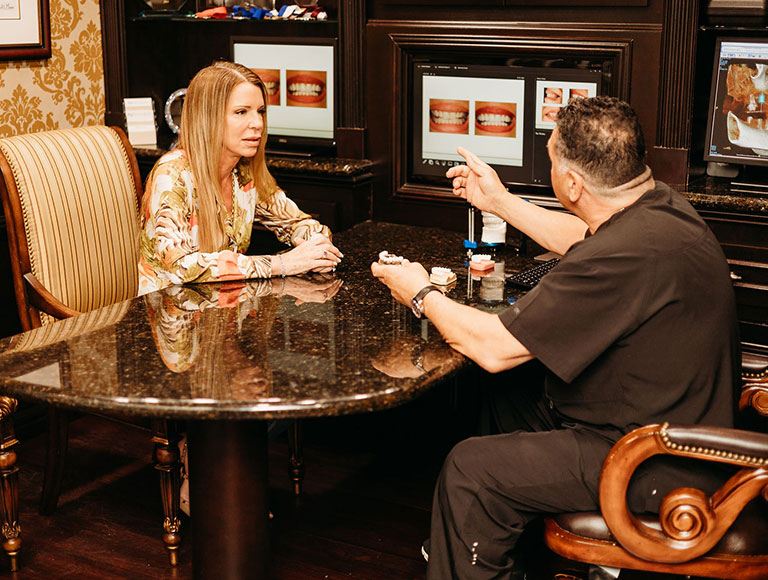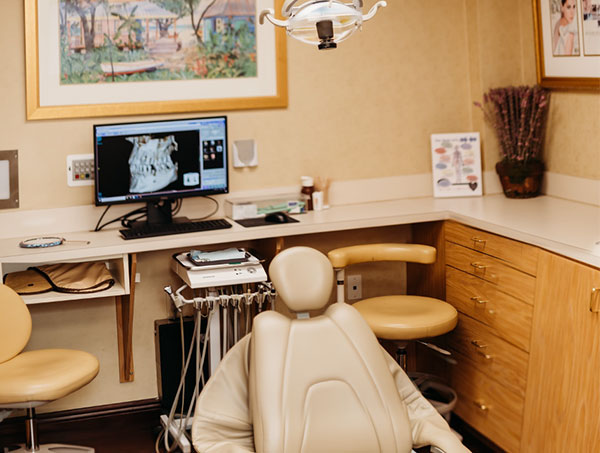Can I Get Dental Implants if I Smoke?

Dental implants are a reliable, long-term solution for replacing missing teeth. However, certain lifestyle choices, like smoking, can significantly impact the success of your dental implant procedure. Those who smoke may be wondering if dental implant treatment is right for them.
The short answer is yes, you can get dental implants if you smoke. However, at PGA Dentistry, we emphasize the importance of quitting smoking to ensure the longevity and effectiveness of your dental implants.
To learn more about dental implants in Palm Beach Gardens, contact one of the top dental implant dentists at (561) 627-8666.
Cigarette Smoking Affects Your Oral Health
Smoking has a significant impact on oral health. Here are some of the negative effects that smoking can have on the mouth and teeth:
Periodontal disease: Smoking is one of the leading causes of periodontal disease. Gum disease is a bacterial infection of the gums and bones that support the teeth. It causes redness, swelling, bleeding, and even tooth loss. Smoking weakens the immune system, making it harder for the body to fight off infections, including gum disease.
Bad breath: Smoking can cause bad breath, or halitosis, due to the buildup of bacteria and plaque in the mouth. This can be embarrassing and affect a person’s self-confidence.
Tooth discoloration: Smoking can cause yellow or brown stains on the teeth that are difficult to remove with brushing or professional cleanings.
Oral cancer: Smoking is a major risk factor for oral cancer. Oral cancer can occur in the mouth, throat, or lips and can be life-threatening if not caught early.
Delayed healing: Smoking can slow down the healing process after dental procedures, such as extractions, implant placement, or gum surgery. This can increase the risk of complications and infection.
How Does Smoking Affect Dental Implants?
-
Slows the Healing Process
One of the most critical factors for the success of dental implants is proper healing. Dental implants rely on a process called osseointegration, where the titanium post fuses with your jawbone to form a secure foundation for your new tooth. Smoking reduces blood flow to your oral tissues, limiting oxygen and nutrients required for healing. This compromised blood flow can delay osseointegration and increase the risk of implant failure.
-
Increased Risk of Implant Failure
Smoking also increases the risk of implant failure. Nicotine and other chemicals found in cigarettes weaken the bone and make it more difficult for the implant to fuse with the bone. Additionally, smoking can increase the risk of developing an infection, leading to implant failure if not treated as soon as possible.
-
Increased Risk of Infection
Smoking weakens your immune system, making you more susceptible to infections after dental implant surgery. Post-operative infections can compromise the healing process, causing the implant to fail or, in severe cases, leading to the need for removal. The nicotine in cigarettes also constricts blood vessels, further reducing the body’s ability to fight infections effectively.
-
Increased Risk of Peri-Implantitis
Peri-implantitis is a condition that occurs when the tissue around the implant becomes infected and inflamed. Smoking can increase the risk of peri-implantitis, which can lead to implant failure and the need for additional surgeries. Additionally, smokers are more likely to develop periodontal disease, which can further compromise the success of dental implant treatment.
-
Gum Disease and Bone Loss
Smoking is one of the leading causes of gum disease, which can affect the health of your gums and jawbone—both crucial for successful dental implants. Periodontal disease, caused by smoking, can lead to bone loss, reducing the available bone for the implant to fuse with. Smokers are at a higher risk of experiencing implant failure due to inadequate bone support and ongoing gum disease issues.
-
Aesthetic Complications
Smoking can also lead to aesthetic concerns after dental implant surgery. Tobacco use is known to cause gum recession, which can expose the metal part of the implant, leading to an undesirable appearance. Additionally, smoking can cause tooth discoloration, affecting the appearance of your natural teeth and making your new implant stand out.
Signs of Dental Implant Failure
Dental implant failure is rare, but it does occur, especially for those who smoke and don’t follow post-op care guidelines. If you’re experiencing implant failure, you may notice the following signs:
Inflamed or bleeding gums
Severe oral pain
Discomfort while chewing
Gum recession
Swelling at the surgical site
Loose implant or replacement tooth
When you experience the symptoms mentioned above, call our Palm Beach Gardens dental implant provider immediately. They’ll get you in as soon as possible and go through the correct course of treatment to get your oral health back on track.
Tips for Quitting Cigarette Smoking
Cigarette smoking affects dental implants and is a major risk factor for early implant failure. Quitting smoking is one of the most important steps a patient can take to improve the success of dental implant placement. Here are some tips for quitting smoking that may be helpful for patients:
Join a support group: Joining a support group can be a great way to connect with others who are also trying to quit smoking. This can provide encouragement, accountability, and motivation to quit smoking altogether, even after dental implant surgery.
Use nicotine replacement therapy: Nicotine replacement therapy, such as patches, gum, or lozenges, can help ease cravings and reduce withdrawal symptoms. Talk to a healthcare provider or your implant dentist before starting any nicotine replacement therapy.
Seek professional help: Healthcare providers can provide resources and support to help patients quit smoking. This may include counseling, medication, or a combination of both.
Avoid triggers: Triggers, such as stress, alcohol, or being around other smokers, can make it harder to quit smoking. Avoiding triggers and finding healthy ways to cope with stress can increase the likelihood of success.
Set a quit date: Setting a quit date can provide a clear goal and help patients stay motivated. Choose a date that allows enough time to prepare and gather support.
Frequently Asked Questions
-
Can I smoke before or after the implant procedure?
Smoking before or after a dental implant procedure is strongly discouraged, as nicotine and tobacco constrict blood vessels, slowing healing and increasing infection risk by up to 20%. Abstaining from smoking enhances osseointegration, the process where the implant fuses with the jawbone, ensuring a 95% success rate in non-smokers. If you must smoke, using a patch or gum is less harmful but still risky.
-
How long do I need to quit smoking before and after the implant procedure?
Quit smoking at least two to four weeks before the implant procedure to improve blood flow and reduce complications, with studies showing a 10% lower failure rate in those who abstain. After surgery, avoid smoking for at least eight to 12 weeks to support osseointegration and minimize infection risks, which can affect up to 15% of smokers. Joining a smoking cessation program or using behavioral support can aid compliance.
-
Can I use nicotine replacement therapy instead of quitting smoking?
Nicotine replacement therapy (NRT), such as patches or gum, is not recommended, as nicotine still restricts blood flow to gums and bone, potentially delaying healing by 20–30% compared to non-nicotine users. For optimal implant success, complete nicotine cessation is ideal, but if NRT is necessary, discuss low-dose options with a healthcare provider at least two weeks before surgery. Avoiding all nicotine post-surgery for 8 weeks supports proper recovery. Dr. Ajmo, our Palm Beach Gardens implant specialist, can guide you on safe alternatives to minimize risks.
-
What is the success rate of dental implants for smokers?
Research indicates that individuals who smoke have a higher risk of implant failure, with rates ranging from 6.5% to 20% compared to non-smokers, compared to 1-5% for non-smokers. The reason for this increased risk is that tobacco and nicotine can lead to constriction or narrowing of blood vessels in the gum tissues of the mouth, which can impede the healing process necessary for successful dental implant integration.
-
When do most dental implants fail?
Most dental implant failures occur within the first three to six months during osseointegration, when poor healing, infection, or inadequate bone support can destabilize the implant, affecting 5–10% of cases. Long-term failures, seen in 1–2% of implants after 5–10 years, often result from peri-implantitis or mechanical issues like crown wear. Risk factors like smoking or uncontrolled diabetes increase early failure rates.
Find Out if Dental Implants Are Best for You
If you’re a smoker considering dental implants, the team at PGA Dentistry in Palm Beach Gardens, FL, is here to guide you through the process. We understand the unique challenges smokers face with dental implants and are committed to helping you achieve a healthy, long-lasting smile.
To schedule your dental implant treatment consultation, contact our Palm Beach Gardens dentist today at (561) 627-8666.

Complimentary Consultation
or 2nd Opinion
- Exam
- Full mouth X-rays
- Private Consultation with Doctor ($450value)
- 7100 Fairway Dr Ste 59,
Palm Beach Gardens, FL 33418 - (561) 627-8666
- Monday: 8am - 5pm
- Tuesday: 8am - 5pm
- Wednesday: 8am - 5pm
- Thursday: 8am - 5pm
- Friday: 8am - 1pm
- Saturday & Sunday: Closed